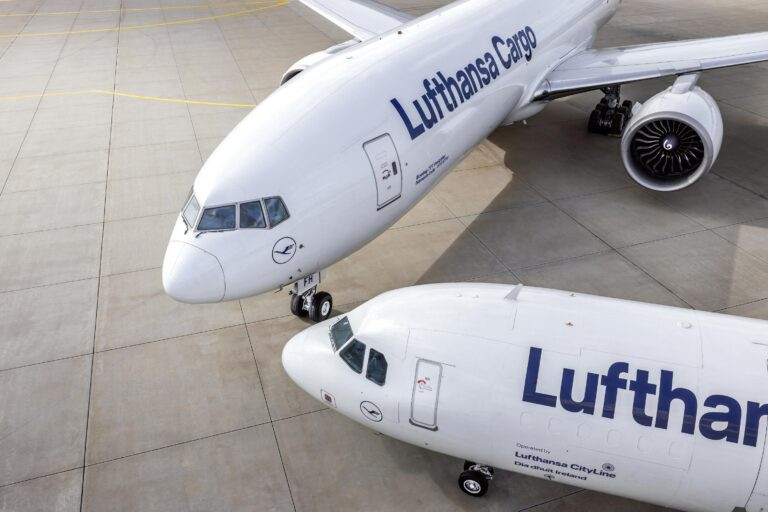Having been appointed just over 12 months ago, the past year has been a rollercoaster for Lufthansa Cargo’s CEO Ashwin Bhat, who transitioned into his role amidst the normalisation of the air cargo business post-Covid-19.
“Not only did I have to adjust to being CEO, but I also took over during a turbulent period for the air cargo industry,” Bhat stated. “We call it the VUCA world, which stands for volatility, uncertainty, complexity, and ambiguity. In such a volatile world, we cannot focus solely on the short term or the long term; we must manage both simultaneously.”
In the short term, Lufthansa Cargo is clear that it must navigate the current market conditions and make tactical operational decisions to manage its network, profitability, and quality, adapt to the market, and take the necessary actions to maintain its position.
Alongside that, the carrier is focused on long-term growth, constantly monitoring and adapting to changes in various sectors such as express shipments, automotive, pharmaceuticals, and semiconductors.
“Growth is not just about expanding our product portfolio but also about identifying which markets will gain traction and how to deploy our capacity effectively,” Bhat explained. “This includes decisions about digitalisation and investment strategies. Balancing short-term management with long-term growth is essential, and growth will remain a constant focus for us.
“Despite the change and uncertainty, I have no complaints. It’s been a fun ride and a great honour to be the CEO of such an iconic brand.”
Boosted by belly capacity
Looking ahead, Bhat sees the carrier’s “unique advantage” in its position as a global combination carrier, using dedicated freighters, belly hold of passenger planes and their ability to utilise trucking capacity across Europe as central to their flexibility and adaptability.
“What sets Lufthansa Cargo apart is not just the capacity, which many other carriers can provide, but the renowned Lufthansa quality and reliability,” Bhat stated proudly.
“Our team possesses the specialised knowledge needed to transport various types of cargo. Additionally, we have cultivated strong relationships with the industry. Most importantly, Lufthansa Cargo is recognised for its commitment to quality and reliability, which we consistently deliver.”
e-commerce opportunity
Air cargo is primarily utilised by shippers for its reliability and speed, essential attributes for segments like e-commerce that depend on rapid delivery. Lufthansa Cargo’s investment in convertible A321 aircraft aims to enhance express services, providing faster connections from its hub in Frankfurt to various parts of its network.
In the past year, Lufthansa Cargo has opened approximately 27 new stations thanks to the A321, expanding its reach to destinations like Casablanca, Sweden, and Malta for various commodities and products. The common factor across these markets is the need for speed and reliability. This need isn’t exclusive to e-commerce; traditional cargo also demands quick and dependable transport.
“In the past 12 months, while air cargo has seen a decline, e-commerce has grown by 20 percent. If I look at my own household, it seems like more than 20 percent, judging by how often the post person or DHL is delivering packages. I might need my own sorting machine at home!,” Bhat joked.
“People’s behaviour has shifted significantly. Traditionally, there was seasonality in shipping, particularly around Christmas. However, it’s too early to say if such seasonality applies to e-commerce.
“Forwarders in the e-commerce sector, despite witnessing nearly 20 percent growth last year, are projecting another 20 percent growth for this year. This suggests continuous growth without clear seasonal patterns. While there might be slight fluctuations, e-commerce shopping seems to be a year-round phenomenon that’s here to stay.”
Costs and efficiency
With the rapid advancement of technology, Lufthansa Cargo is closely monitoring opportunities to leverage these developments to enhance its operations, such as being among the first to sign IATA’s Digitalisation Leadership Charter and pushing forward the ONE Record initiative for smooth and efficient data exchange.
Currently, the carrier is planning to invest half a billion euros over the next six years to modernise its hub – the heart of its business. This will focus on leveraging new technology, robotics, and optimised processes to minimise ground time and ensure careful handling of cargo.
“Our focus isn’t just on the hub but also on improving our processes, workforce efficiency, and communication with customers. This comprehensive approach addresses efficiency and volatility management. There is no single solution; it requires a coordinated and orchestrated series of actions to achieve these benefits,” Bhat outlined.
“I firmly believe that technology will help us become more efficient, faster, and more transparent for our customers,” he declared. “Embracing technology is essential, both in business and personal life.”




